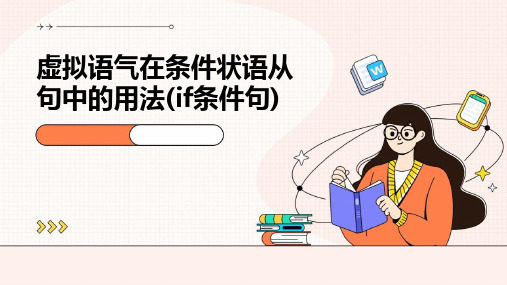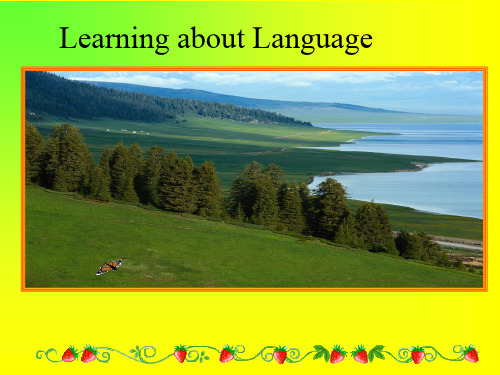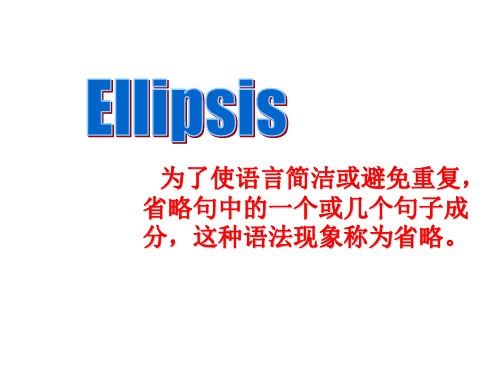译林英语选修8Unit2虚拟语气在IF条件句中的用法(共25张PPT)
合集下载
虚拟语气在条件状语从句中的用法(if条件句)

在写作中的应用
创作文学作品中
在创作小说、诗歌等文学作品时, 虚拟语气可以用来表达虚构的情 节和角色情感,增强作品的情感
色彩和艺术效果。
撰写学术论文
在撰写学术论文时,使用虚拟语 气可以表达假设的情景或条件, 例如在讨论不同政策或方案的影
响时。
写邮件和信件
在写邮件或信件时,使用虚拟语 气可以表达礼貌和尊重,例如在
在撰写商务广告和宣传材料时,使用虚拟语气可以增强语 言的感染力和说服力,例如“假如您正在寻找更好的产品 ,那么您来对了地方。”
感谢您的观看
THANKS
if条件句中的虚拟语气与时间状语从句的时态不一致
总结词
当if条件句中的虚拟语气与时间状语从句的时态不一致 时,通常是为了强调或表达与时间状语从句相反的情 况。
详细描述
在英语语法中,当if条件句中的虚拟语气与时间状语从 句的时态不一致时,通常是为了强调或表达与时间状语 从句相反的情况。这种用法能够使句子更加生动和富有 表现力,突出说话者对某个特定时间点的态度或情感。 例如,在句子"If I had known the answer yesterday, I would have told you."中,虚拟语气"had known" 与时间状语从句的时态"yesterday"不一致,强调了说 话者对过去的遗憾或后悔。
虚拟语气在条件状语从 句中的用法(if条件句)
目录
CONTENTS
• 虚拟语气在条件状语从句中的基本结构 • 虚拟语气在条件状语从句中的用法 • 虚拟语气在条件状语从句中的特殊情况 • 虚拟语气在条件状语从句中的实际应用
01 虚拟语气在条件状语从句 中的基本结构
虚拟语气在条件状语从句中的用法if条件句共26页文档

4.without和but for 构成含蓄虚拟。(but for要 不是)
• Without sunlight, people’s life would be different from today.
• But for your help, I wouldn’t have finished the work.
条件从句 If 从句的谓语形式 主句的谓语形式
现在
did / were
would/could/should/ might +V.(原)
过去
had done
would/could/should/ might+have+p.p.
未来
1. did / were 2. should do
would/could/should/ might + V.(原)
5. A. had met
B. met
6. C. would meet
D. would have met
虚拟语气
3. If only I ___ to my parents! (But I didn’t.)
A. listened
B. had listened
C. should listen D. would listen
Because they didn’t get prepared for it.
Chinese Woman Football Team
They would win,
if they got prepared for it.
if they trained very hard.
if they acted actively in the court.
译林牛津版高二英语虚拟语气用法总结课件(共33张)

1. if从句中, 省略if,were,had,should可以放在句 首,(用于倒装结构),否定词not不能放在前面。
1.If I were you, I would accept his advice. Were I you,……
2.If it should rain tomorrow, I would stay at home.
2.He telephoned to inform me of your birthday, or I would have known nothing about it.
3.Without / But for your help, we couldn’t have finished the work ahead of time. =If it had not been for your help, …
1.I was ill that day. Otherwise, I would have taken part in the sports meeting.ห้องสมุดไป่ตู้
=If I hadn’t been ill that day, I would have taken part in the sports meeting.
He hesitated for a moment before kicking the ball, otherwise he _____ a goal.
A.had scored B.scored C.would score D.would have scored
If it rained(should rain/were to rain )tomorrow, I would stay at home. 3.如果你以前好好学习, 你会通过考试的。
if条件句中虚拟语气用法PPT课件

与将来事实相反的虚拟语气
表示与将来实际情况相反的情况,使用“would+动词原形”的形 式。
虚拟语气的使用场景
表达假设或虚构的情况
文学作品中的表达
当需要表达与实际情况相反的情况时, 可以使用虚拟语气来强调这种假设或 虚构的情境。
在文学作品中,虚拟语气常常被用来 表达作者对人物、情节或情感的虚构 和想象。
03 if条件句中虚拟语气的用 法
表示与事实相反的情况
1 2
结构
if+虚拟语气+主句
例子
If I were you, I would take the job. (如果我是 你,我就会接受这份工作。)
3
解释
此句表示“如果我是你”,但实际上“我不是 你”,所以使用虚拟语气。
表示主观愿望和假设
01
语气一致性
在if条件句中,虚拟语气的语气要保 持一致,即主句和从句的语气要相呼 应。
例如,在表示与现在事实相反的虚拟 语气中,主句和从句都应使用一般过 去时(would+动词原形),表示假设 的情况。
语境理解
在使用if条件句中的虚拟语气时,要充分理解语境,根据上下文判断是否需要使 用虚拟语气。
例如,在描述与将来事实相反的虚拟语气时,需要根据上下文判断是否需要使用 将来完成时(would+have+过去分词),表示与将来事实相反的情况。
if条件句中虚拟语气用法ppt课件
contents
目录
• 虚拟语气简介 • if条件句中虚拟语气的形式 • if条件句中虚拟语气的用法 • if条件句中虚拟语气的注意事项 • 练习与巩固
01 虚拟语气简介
定义与特点
定义
虚拟语气是一种特殊的动词形式 ,用来表示与实际情况相反的情 况或者假设的情况。
表示与将来实际情况相反的情况,使用“would+动词原形”的形 式。
虚拟语气的使用场景
表达假设或虚构的情况
文学作品中的表达
当需要表达与实际情况相反的情况时, 可以使用虚拟语气来强调这种假设或 虚构的情境。
在文学作品中,虚拟语气常常被用来 表达作者对人物、情节或情感的虚构 和想象。
03 if条件句中虚拟语气的用 法
表示与事实相反的情况
1 2
结构
if+虚拟语气+主句
例子
If I were you, I would take the job. (如果我是 你,我就会接受这份工作。)
3
解释
此句表示“如果我是你”,但实际上“我不是 你”,所以使用虚拟语气。
表示主观愿望和假设
01
语气一致性
在if条件句中,虚拟语气的语气要保 持一致,即主句和从句的语气要相呼 应。
例如,在表示与现在事实相反的虚拟 语气中,主句和从句都应使用一般过 去时(would+动词原形),表示假设 的情况。
语境理解
在使用if条件句中的虚拟语气时,要充分理解语境,根据上下文判断是否需要使 用虚拟语气。
例如,在描述与将来事实相反的虚拟语气时,需要根据上下文判断是否需要使用 将来完成时(would+have+过去分词),表示与将来事实相反的情况。
if条件句中虚拟语气用法ppt课件
contents
目录
• 虚拟语气简介 • if条件句中虚拟语气的形式 • if条件句中虚拟语气的用法 • if条件句中虚拟语气的注意事项 • 练习与巩固
01 虚拟语气简介
定义与特点
定义
虚拟语气是一种特殊的动词形式 ,用来表示与实际情况相反的情 况或者假设的情况。
if条件句中虚拟语气课件PPT课件

学习心得体会
通过本课的学习,我深入了解了虚拟 语气的使用规则和应用场景,对英语 语法有了更深入的认识。
本课的学习不仅提高了我的英语水平, 也让我对英语语法产生了更浓厚的兴 趣。
在学习过程中,我遇到了一些困难, 但通过不断练习和总结,我逐渐掌握 了虚拟语气的使用技巧。
在未来的学习中,我将继续深入探索 虚拟语气在不同语境中的应用型
01
与现在事实相反的虚拟语气
表示与当前实际情况相反的情况,使用过去时态来表示。例如:“If I
were you, I would choose the latter option.”
02
与过去事实相反的虚拟语气
表示与过去实际情况相反的情况,使用过去完成时态来表示。例如:
“If I had known the answer, I would have told you earlier.”
03
与将来事实相反的虚拟语气
表示与将来实际情况相反的情况,使用过去时态或过去完成时态来表示
。例如:“If I were to do it again, I would make different
choices.”
03 if条件句中虚拟语气的用 法
表示与现在事实相反的情况
总结词
使用would+动词原形
填空题
• 题目:If he _____ the right answer, he would have won the game.
填空题
答案
01
had given
解析
02
从句与过去事实相反,表示与过去事实相反的情况,从句用“
过去完成时”。
题目
03
If she _____ more attention in class, she would have
译林英语选修8Unit2Ellipsis (共24张PPT)

2.从句中从属连词词的的省略
(2)虚拟条件句有时可以省略if,但从句要倒装
1、 Had we been here a bit earlier, we
__________ able to catch the last bus.
A. must have been B. would have been
C. had been
2. Although (he was) punished, he didn’t care about it at all.
1).在状语从句中,从句的主语与主句的主语一致
且后面跟有be动词时,可省去“主语+be”部分。
1. 状语从句中的主谓省略
1. Remove clothing using scissors if it is necessary unless it is stuck to the burn.
The boss made the workers work all day and all night.
The workers were made to work all day and all night.
(1)、Mr. White was seen ______ the Palace
Museum.
A.What it was
B.When was it
C.When it was
D.What was it
三、(简单句)习惯省略
2.在密切联系的语境中(上下文),为避免重复,下 文句子中作宾语或宾语补足语成分与前文相同, 可以将相同的部分省略,用to代替整个词组。
e.g. (1)、I meant to write to you, but forgot to.
虚拟语气-(共51张)PPT课件
A. Were B. should C. would D. will
-
18
If you had followed my advice, you would be
able to finish the work now. 如果你当时听了我的话,现在就能完成这份 工作了。 (从句说明过去,主句说明现在。)
时 间 If 条件句
主句
过去
现在
将来
-
10
一、一般条件句中的虚拟语气
时 间 If 条件句
主句
过去
had done
would should could might
+have done sth
现在
would
助动词 be用 were should 实义动词 do 用 did could
might
+ do sth
Without your help, we D____ such rapid progress.
A. couldn’t make B. wouldn’t make
C. will not have made D. wouldn’t have made
-
24
名词性从句中的虚拟句
-
25
宾语从句中的虚拟语气
句式一:wish后面宾语从句中的虚拟语气,表示
与事实相反的愿望。其表达形式一般是将从句的谓
语动词退后一个时态。例如:
1)与现在事实相反 : wish + (that)+did(were)
I wish I were as healthy as you.
A.could take B.would take
C.will have taken D.would- have taken
if引导虚拟语气条件句PPT课件
06
总结与回顾
回顾if引导虚拟语气条件句的用法
虚拟语气在条件句中的用法
在条件句中,使用虚拟语气表示与实际情况相反的情况,或者表 示假设、猜测等。
虚拟语气的形式
虚拟语气有多种形式,包括与现在事实相反、与过去事实相反、与 将来事实相反等。
虚拟语气的时态
虚拟语气与时态有关,需要根据实际情况选择适当的时态。
况,主句用would+have+过 去分词的形式。
翻译题
01
02
03
中文
如果我知道这个消息,我 早就告诉你了。
英文
If I had known the news, I would have told you long ago.
解释
从句表示与过去事实相反 的情况,主句用 would+have+过去分词 的形式。
题目
If he _______ the money, he _______ able to buy a car.
had had; would be
答案
解释
从句表示与过去事实相反的情况,主句用would+______ rained last night,
the ground would be wet this morning.
表示与事实相反的情况
总结词
与事实相反的情况是指条件句中的假设与现实情况相 反,主句使用虚拟语气表示与实际情况的差异。
详细描述
在英语中,当if引导的条件句表示与事实相反的情况时, 主句通常使用虚拟语气。这种用法常用于表示某种假设 的情况并未实现,而是与现实情况相反。例如,“If I were you, I would not make that mistake again.” (如果我是你,我不会再犯那个错误了。)这句话表示 的是假设自己是对方,但实际上并不是,提醒对方不要 犯同样的错误。
If引导的虚拟语气ppt课件
4
1. 对现在的虚拟
if条件句中的谓语动词 主句的谓语动词
动词用过去形式 (be动词用were)
should/ would/ could/ might + 动词原形
If I were you, I would/ could/ should/ might do that.
If I had money, I would/ could/ should/ might buy that house.
将来
1. 动词过去式 2. should+动词原形 3. were to+动词原形
would/could/should/might +动词原形
9
1.If the world-war broke out again, what
_w_o_u__ld__h_a_p_p_e_n___(happen) to our people on
I would try to find a cure for cancer.
8
Fill in the blanks
时间 if 条件句谓语
主句 谓语
动词过去式 现在 (be动词用were)
would/could/should/might +动词原形
过去 had+过去分词
would/could/should/might + have+过去分词
这类虚拟语气由“should+动词原形”构成,
13
虚拟语气定义:
用来表示说的话不是事 实,或者是不可能发生的情 况,而是一种愿望,建议, 假设的语气叫虚拟语气。
3
if引导的虚拟条件句
If she invited me, I would go to the party. 假如她邀请我参加聚会,我就去。 If she had invited me yesterday, I would have gone to the party. 假如她昨天邀请我参加聚会,我就去了。 If she should invite me tomorrow, I would go to the part 如果她明天邀请我参加聚会,我会去的。
1. 对现在的虚拟
if条件句中的谓语动词 主句的谓语动词
动词用过去形式 (be动词用were)
should/ would/ could/ might + 动词原形
If I were you, I would/ could/ should/ might do that.
If I had money, I would/ could/ should/ might buy that house.
将来
1. 动词过去式 2. should+动词原形 3. were to+动词原形
would/could/should/might +动词原形
9
1.If the world-war broke out again, what
_w_o_u__ld__h_a_p_p_e_n___(happen) to our people on
I would try to find a cure for cancer.
8
Fill in the blanks
时间 if 条件句谓语
主句 谓语
动词过去式 现在 (be动词用were)
would/could/should/might +动词原形
过去 had+过去分词
would/could/should/might + have+过去分词
这类虚拟语气由“should+动词原形”构成,
13
虚拟语气定义:
用来表示说的话不是事 实,或者是不可能发生的情 况,而是一种愿望,建议, 假设的语气叫虚拟语气。
3
if引导的虚拟条件句
If she invited me, I would go to the party. 假如她邀请我参加聚会,我就去。 If she had invited me yesterday, I would have gone to the party. 假如她昨天邀请我参加聚会,我就去了。 If she should invite me tomorrow, I would go to the part 如果她明天邀请我参加聚会,我会去的。
if引导的虚拟语气条件句ppt课件
最新版整理ppt
10
Practice
1. If you had told me in advance, I ____ him at the airport. A. would meet B. would have met C. would had met D. should meet
最新版整理ppt
attend the party.
If it were to rain tomorrow, I wouldn’t
attend the party.
最新版整理ppt
8
特例
1. 错综时间条件句
定义:主句和从句动作发生的时间不同
例1) If they had studied hard, they could finish the
attend the party.
A. rained
B. rains
C. had rained
D. were to rain
3. I would have gone to the meeting
if I __time.
A. had had
B. have had
C. had
D. would have had
例:Had I seen him then, I would have been very happy.
=If I had seen him then, I would have been very happy.
Should I have time, I would go with you.
=If I should have time, I would go with you.
三.与将来事实可能相反
- 1、下载文档前请自行甄别文档内容的完整性,平台不提供额外的编辑、内容补充、找答案等附加服务。
- 2、"仅部分预览"的文档,不可在线预览部分如存在完整性等问题,可反馈申请退款(可完整预览的文档不适用该条件!)。
- 3、如文档侵犯您的权益,请联系客服反馈,我们会尽快为您处理(人工客服工作时间:9:00-18:30)。
would/should/could/might+动词原形
③were to+动词原形
反
要是我有足够的钱,我就要环游世界。
If I had enough money, I would go around the world.
SShhoouludld you come ttoo Brunei, you wwoouulldd havee ttoo take off your shoes before
We use unreal future conditionals to talk about imaginary future situations. E. g
1. If I hhaadd the chance, I wwoouulldd havee a cloned baby tomorrow.
• if I could have traveled to another country, I would have,
• Should you get into university in the future, you would have to go and take the opportunity.
10. IIwwoouulldd havee rreeaalllyyeennjojoyyeedditi.t. I think I wouulldd 11. hhaavve ssttuuddiieedd MMeeddicicininee. . IIff yyoouusshhoouuldldggeet tththee 12. cchhaanncceettooggoooovveerrsseeaass,, tthheennyyoouusshhoouuldldtatakekeit.it. 13. I think it is very important to try to understand 14. as much about the world as possible and travel 15. helps you to do that. Hopefully you might 16. become a successful business person or a 17. consultant some day. Weerreeyyoouutotoddooththaat,t, 18. youu wwoouullddcceerrtataininlylyhhaavveeouoruar papprporvoavlaalnadnwdewe 19. woouulldd aalllbbeevveeryrypprorouuddofoyf oyuo.u. I am an old
=
If I were you, I would get up early in the morning. Were I you, I would get up early in the morning.
=
注意: If 条件句中有were/should/ had, 可 以省去if, 并使用倒装语序.
Practice Read the instructions and the articles on page 41 and underline the sentences which use unreal conditionals.
2. How to form unreal conditionals or subjunctive?
We use unreal conditionals to state a present condition or situation that is not real or is imaginary. E. g
1. In my youth, ififIIccoouullddhhaave travveelleeddttooaannooththeer r 2. ccoouunntrtyry,,IIwwoouulldd havee, but I had to work, as our 3. family was very poor and needed another wage. 4.That meant I could not finish my education. 5. Ma Li, education is very important. A good 6. education will help you succeed. SShould yoouu 7. geett iinnttoo uunniivveerrssitityyininththeefufututurere, ,yoyuouwwouoludldhahvaeve 8. to go aannddttaakkeeththeeooppporotrutnuintyit.y. This will enable 9. you to get a good job. HHaadd II had theecchhaannccee, ,
Learning 1. What are unreal conditionals?
Unreal conditionals state a condition or situation that is not real or is imaginary .
如果假设的情况完全不存在或者实现的可 能性很小,可以说几乎没有时,这种条件句就 是非真实的条件句即虚拟条件句,在虚拟条 件句中就要用虚拟语气(subjunctive)来表达。
1.If life hhaadd not beeeenn so hard for me as a child, I woouullddnnootthhaavveestsatratertded working at such a young age.
2.If you hhaaddjojoinineedd the chat room ten minutes ago, you wouldd hhaavveekknnoowwnn what we were talking about
20.man now, but I still have an ambition to travel 21.to Beijing one day. SShhoouulldd II get to BBeeiijjiinngg,,II 22.wwoouulldd vviissiitt tthhee FFoorrbbiiddddeennCCitiytywwhhereerethtehe 23.eemmppeerroorrssoonnccee lived. But I wonder, Ma Li, 24. hhaad I haaddmmoorreeooppppoortrutunnititeiesswwhehnenI wI awsas 25.ggrroowwiinngg up, wwoouulldd IIhhaavveebbeenenasashahpappypaysas 26.I Iaammnnooww??
going to into someone’s house.=
If you should come to Brunei, you would have to take off your shoes before going to into someone’s house.
3. What can we do when we remove the “if”
1. If I wweere you, I woouullddssttuuddyy hard.
2.If I hhaad enough money, I wwoouulldd ggoo around
the world.
We also use unreal past conditionals to refer to an imaginary past action. E. g
If I should see him tomorrow, I would pass your note to him
= Should I see him tomorrow, I would pass…
If he had been there, he would have helped you. Had he been there, he would have helped you.
与过 had+过去分词 去事
would/should/could/might have+过 去分词
实相 要是你努力了话,你一定通过那次考试了。
反
If you had studied hard, you would have past that test.
与将 来事 实相
①动词过去式 ②should+动词原形
• The subjunctive used in ‘if’ conditionals
• Lead in
1. If I hhadd a pair of invisible wings ,I wWoouuld ffllyy in the blue sky.
2.. If you hhaad jjooinineedd the chat room ten minutes ago, you wwouullddhhavaevkenkownonwn what we were talking ck the sentences which use unreal conditionals
1. If I am free tomorrow , I will go shopping with you. 2. If I were you, I would study hard. 3. Even if I was very busy last week, I found time to exercise. 4. If life had not been so hard for me as a child, I would not have started working at such a young age. 5. If you like football, I can recommend a good coach for you. 6. If you had joined the chat room ten minutes ago, you would have known what we were talking about. 7. If I had the chance, I would have a cloned baby tomorrow. 8. If I got married in the UK, I would expect a present 9. If you were to fail my Maths test, I would have to take it again at the end of the term. 10. If you come to Brunei, you shouldn’t wear yellow.
